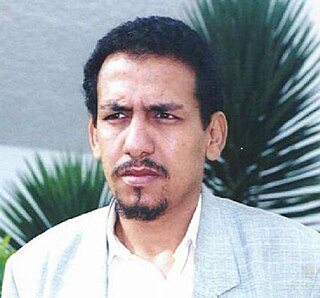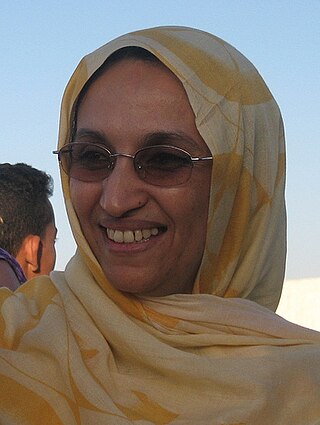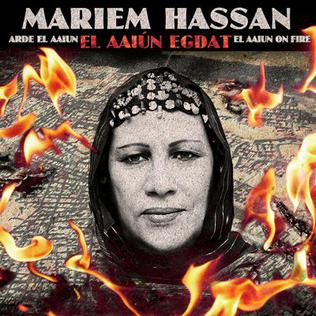
The Green March was a strategic mass demonstration in November 1975, coordinated by the Moroccan government and military, to force Spain to hand over the disputed, autonomous semi-metropolitan province of Spanish Sahara to Morocco. The Spanish government was preparing to abandon the territory as part of the decolonization of Africa, just as it had granted independence to Equatorial Guinea in 1968. The native inhabitants, the Sahrawi people, aspired to form an independent state. The demonstration of some 350,000 Moroccans advanced several kilometers into the Western Sahara territory. Morocco later gained control of most of the former Spanish Sahara, which it continues to hold.

Sahrauis: The Music of the Western Sahara is a three-disc box set of Saharawi music, published by the Spanish label Nubenegra. It was the first compilation of such songs released in the United States. The producers of the album travelled to the Sahrawi refugee camps and spent 14 days with the artists to record the CDs 1 & 2 of the compilation, with the aim of recording with the finest musicians and singers the traditional Sahrawi music (Haul) of the past and present.

Muhammad Sidi Brahim Sidi Embarek Basir was a Sahrawi nationalist leader, disappeared and presumedly executed by the Spanish Legion in June 1970.

Ali Salem Tamek is a Sahrawi independence activist and trade unionist.

Aminatou Ali Ahmed Haidar, sometimes spelled as Aminetou, Aminatu or Aminetu, is a Sahrawi human rights activist and an advocate of the independence of Western Sahara. She is often called the "Sahrawi Gandhi" or "Sahrawi Pasionaria" for her nonviolent protests. She is the president of the Collective of Sahrawi Human Rights Defenders (CODESA). She was imprisoned from 1987 to 1991 and from 2005 to 2006 on charges related to her independence advocacy. In 2009, she attracted international attention when she staged a hunger strike in Lanzarote Airport after being denied re-entry into Moroccan Western Sahara. Haidar has won several international human rights awards for her work, including the 2008 Robert F. Kennedy Human Rights Award, 2009 Civil Courage Prize and 2019 Right Livelihood Award.

The Government of Morocco sees Western Sahara as its Southern Provinces. The Moroccan government considers the Polisario Front as a separatist movement given the alleged Moroccan origins of some of its leaders.

The Sahrawi Association of Victims of Grave Violations of Human Rights Committed by the Moroccan State, or ASVDH, is a Sahrawi human rights organization in the Moroccan-occupied areas of Western Sahara.

Brahim Dahane is a Sahrawi human rights activist and president of the Sahrawi Association of Victims of Grave Human Rights Violations Committed by the Moroccan State.

Mariem Hassan was a Sahrawi singer and lyricist. She usually sang in Hassaniya, an Arabic variant spoken mostly in Western Sahara and Mauritania, occasionally singing in Saharan Spanish.
Najm Allal is a singer, guitarist and writer of lyrics in Spanish from Western Sahara.

Aziza Brahim is a Sahrawi singer and actress.

The Gdeim Izik protest camp was a protest camp in Western Sahara, established on 9 October 2010 and lasting into November that year, with related incidents occurring in the aftermath of its dismantlement on 8 November. The primary focus of the protests was against "ongoing discrimination, poverty and human rights abuses against local citizens".

The 2011 Western Saharan protests began on 25 February 2011 as a reaction to the failure of police to prevent anti-Sahrawi looting in the city of Dakhla, Western Sahara, and blossomed into protests across the territory. They were related to the Gdeim Izik protest camp in Western Sahara established the previous fall, which had resulted in violence between Sahrawi activists and Moroccan security forces and supporters. The protests also purportedly drew inspiration from the Arab Spring and successful revolts in Tunisia and Egypt, although the Arab Spring proper did not reach Western Sahara.

Mariem Hassan, la voz del Sáhara is a 2007 documentary film directed by Manuel Domínguez.

Deseos is the 2005 debut solo album of the Sahrawi singer Mariem Hassan. The album was recorded at Axis estudios in Madrid, and produced by guitarist Baba Salama, who died of leukemia one week before the release of the album. With the use of two electric guitars and two tbals, the album had been hailed as a fresh actualization of the traditional Sahrawi Haul traditional music. The song "La Tumchu anni" is one of the highlights, a picturesque desert blues. It also contains one of Mariem's most known songs, "La Intifada", about the 2005 Sahrawi Independence Intifada. "El Chouhada" is dedicated to her three dead brothers, who were killed fighting during the Western Sahara War, while in "Mutamaniyat" she asks God for the healing of her breast cancer.

Shouka is the second album of Sahrawi singer Mariem Hassan. It was recorded again at Axis studios, in Madrid, and produced by Manuel Domínguez, who is also the boss of the label Nubenegra. The album reached Number 1 on the World Music Charts Europe (WMCE) in March 2010. "Shouka", the central song that titles the album, is a new experience in the Sahrawi music, as it is structured as a cantata. Taking the verses of Sahrawi poet Lamine Allal, Hassan developed a nine paragraph critical response to the 1976 speech of then Spanish opposition leader and later president of Spain Felipe González at the Sahrawi refugee camps, by using all scales and rhythms of the Haul. In this work, Mariem's group is completed with Lamgaifri Brahim and Vadiya Mint El Hanevi. Several other musicians contributed to the album, as Senegalese Malick Diaw (guitar), Spanish Kepa Osés (bass), Hugo Westerdahl (bass), Josemi Sánchez (guitar) and Jaime Muñoz (flutes), Iranian Behnam Samani and Davood Varzideh (ney), and Cuban-Haitian Mel Seme (percussionist).

Mi Canto is the debut solo digital ep of Sahrawi singer Aziza Brahim. It was released worldwide on 12 January 2009 by the French label Reaktion, reaching shortly after number one on the World music list of the web Emusic.com. Brahim, who produced the album herself, is accompanied by her band Gulili Mankoo in the recording.

Brahim Ghali is a Sahrawi politician, military officer and current president of the Sahrawi Arab Democratic Republic (SADR), formerly its ambassador to Algeria and Spain.

El Aaiun egdat is the third album of Sahrawi singer Mariem Hassan. The album reached Number 1 on the World Music Charts Europe (WMCE) on June and July 2012. It was also elected as the best album presented at the 2012 edition of the World Village Festival in Helsinki, Finland.
Al Khadra Mint Mabrook, known as Al Khadra, was an internationally recognised Sahrawi poet.



















